Former Premier Campbell Newman regrets introducing his government’s signature anti-bikie laws, admitting they were “draconian” and unnecessary.
A decade after the infamous Broadbeach bikie brawl sparked an unprecedented crackdown on outlaw motorcycle gangs, many of the key figures involved in the creation of the laws now have mixed feelings about the impact of decisions they made in the hours after the 2013 riot.
On September 27, 2013 more than 60 Bandidos led by Jacques Teamo flooded into central Broadbeach and started a brawl with rival bikies, Fink Jason Trouchet and Finks associate Matthew Jason Sward.
A handful of police tried to hold the line and were left yelling for back-up. At one point a senior officer on the scene warned the bikies the junior officers with him were scared, had guns and it was in the best interests of the bikies to “back” up.
The Vicious Lawless Associate Disestablishment (VLAD) laws would prove a lightning rod for controversy, allowing for longer jail sentences and preventing anyone suspected of being gang members from being in the company of one another.
Mr Newman, the former LNP leader who was premier from 2012 to 2015, now says he has regrets about the controversial laws, designed by then-attorney general Jarrod Blejie and then-solicitor general Walter Sofronoff. They were introduced just two weeks after the violent attack at Broadbeach’s Aura restaurant.
“Looking back on the whole thing, I just don’t believe that it was necessary,” Mr Newman said
“I think they also confused the issue and made for controversy that was unnecessary. I think the police had all the necessary tools to do the job to clean up the issue and they had to enforce the laws as they stood, they just had to go after criminal groups.
“The VLAD laws were not required to do that and the real wins were through using the existing laws, through using the police and the Crime and Corruption Commission processes.
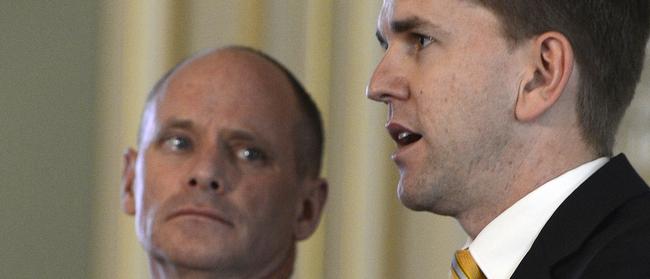
“And that’s how it was done.”
The VLAD laws, at the time of their 2013 introduction, were declared the toughest measures of their kind in the world and allowed groups or suspected members to be declared criminals without proof.
Bikie gang members faced automatic long prison sentences in special prison units, would have their motorcycles confiscated and destroyed and other measures under the crackdown. Civil libertarians were horrified.
Legal experts warned the laws could be used to break up any organisation such as trade unions.
The Newman Government also proposed forcing bikies to wear pink jumpsuits, restrictions on prison visits and bans on television viewing.
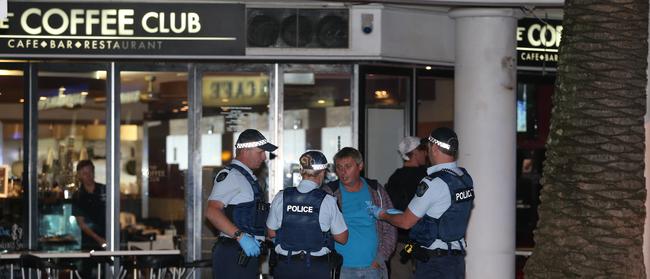
Under the crackdowns, motorcycle riders across the state were targeted, regardless of whether they were gang members or not. Police in late 2013 intercepted a man wearing a T-shirt from the television series Sons of Anarchy.
Mr Newman blamed overzealous police for much of the poor publicity surrounding the laws.
“I think the laws were then misused by some police in that people who were just people enjoying riding motorbikes were unnecessarily pulled over by the police in the pursuit of this whole thing,” he said.
“And I still today go, ‘well, why was that necessary?’ I didn’t want them to go after people enjoying riding a Harley Davidson. That wasn’t the brief.
“I’m sorry that those people were impacted in that way. It wasn’t the intent at all.”
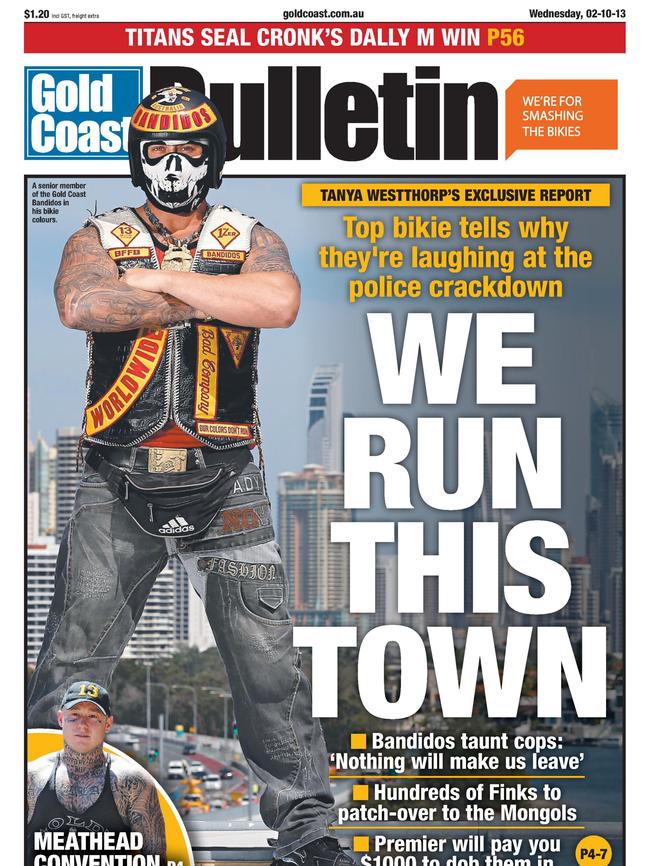
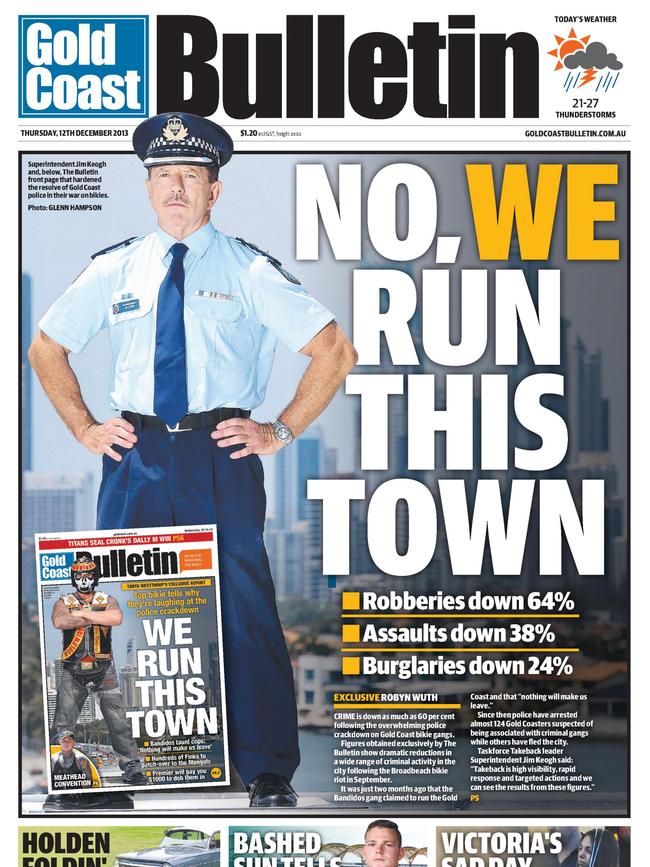
Surfers Paradise MP John-Paul Langbroek who witnessed the aftermath of the brawl in Broadbeach on September 27 agreed with Mr Newman and said both the rapid introduction of the laws and their use by police both proved long-term issues for the government,
“In other parts of the state, there were probably two issues, one of which was that we hadn’t made the case about why it was that bikie gangs are necessarily bad,” he said
“And the second problem was at a local police level, when you’ve got 10,000 police, it’s very hard to get a message down to frontline police that you don’t have to pull over every guy riding a bike or woman riding a bike to and from work every day because you’re insinuating that they’re a bikie, not a biker.
“And that was something else that subsequently Campbell Newman said to me, we probably should have had an inquiry first instead of going straight to legislation. An inquiry would’ve led to more information coming out and then saying, as a result of that, we are going to crack down.
“But (the speed the legislation was introduced) showed how big the incident was.”
A review of the laws by the state government’s Taskforce on Organised Crime Legislation took a dim view on the laws.
“The QPS reports that, overall, 202 individual persons have been charged with criminal offences as a vicious lawless associate and of those 202 persons, 36 were identified as either members (21) or associates (15) of an OMCG,” the report reads.
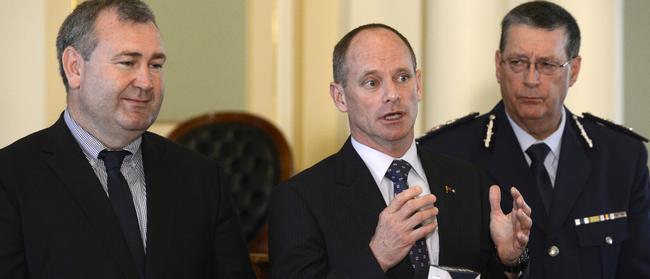
“That figure of 36 people, importantly, includes ex-members who disassociated from their OMCG throughout that period, and ex associates.
The remaining 166 individuals are not known to be members or associates of an OMCG, hence OMCG members make up no more than 17.8 per cent of all offenders charged under the VLAD Act and only 0.02 per cent of the total offending population (when compared with the total number of person charged with any criminal offence in the same time period).”
The same report noted the police at the time argued “the available statistics do not necessarily reflect the true extent of OMCG involvement in serious and organised crime in Queensland, and the associated risk that OMCGs pose to community and Police Officer safety”.
The laws would later be repealed by Annastacia Palaszczuk’s government in 2016.

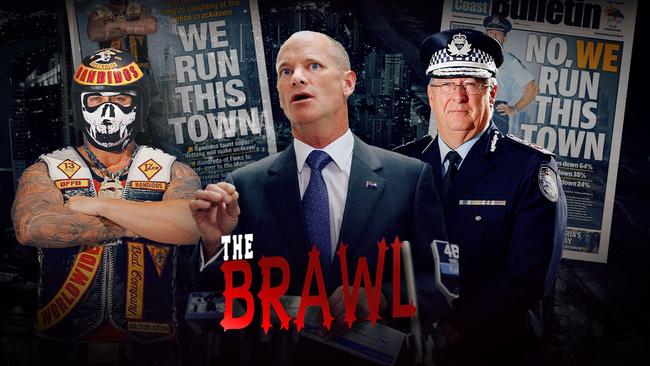
Add your comment to this story
To join the conversation, please log in. Don't have an account? Register
Join the conversation, you are commenting as Logout
More than a theme park: Dreamworld’s dramatic expansion plan
Tourism giant Dreamworld wants to fast track a massive expansion of the theme park, with an incredible array of features including hotels and residential towers. FIND OUT MORE
My rise and fall: $65m brewery co-founder to ‘feeling like a loser’
Three years ago Black Hops craft brewery co-founder Dan Norris had a big stake in his own $65m brand and a $3.1m dream home - now he’s not involved, broke and “ashamed”. SEE THE VIDEO